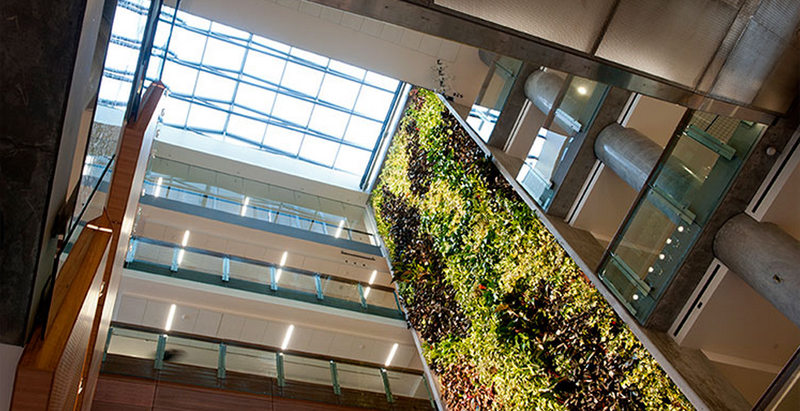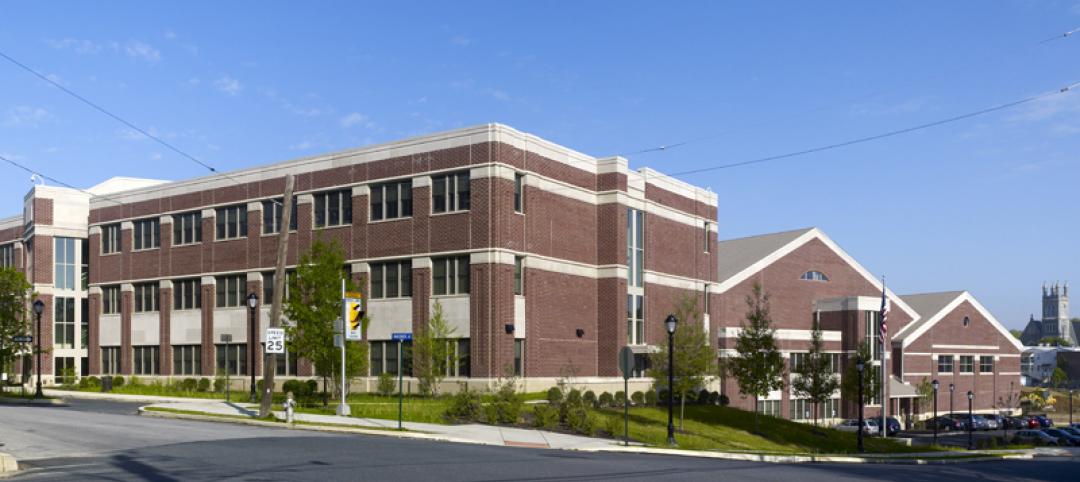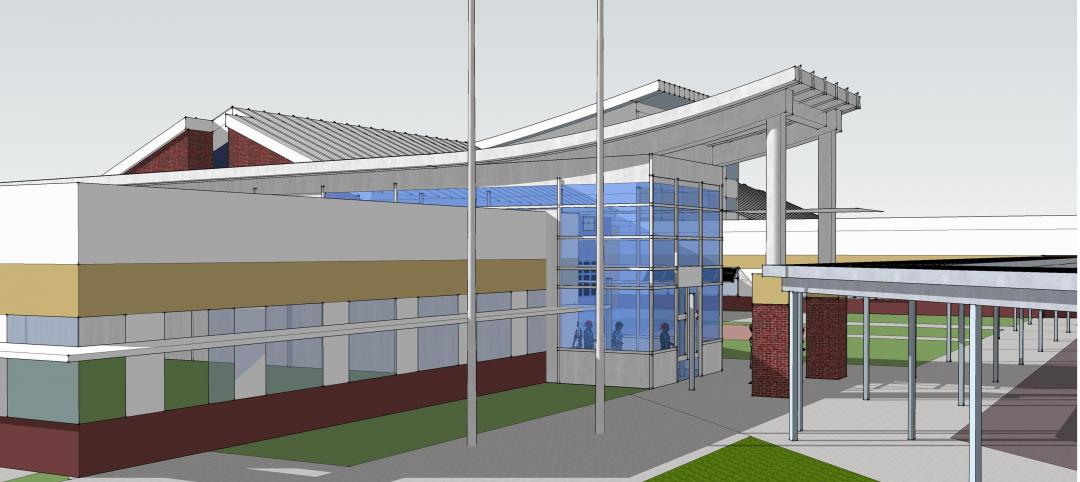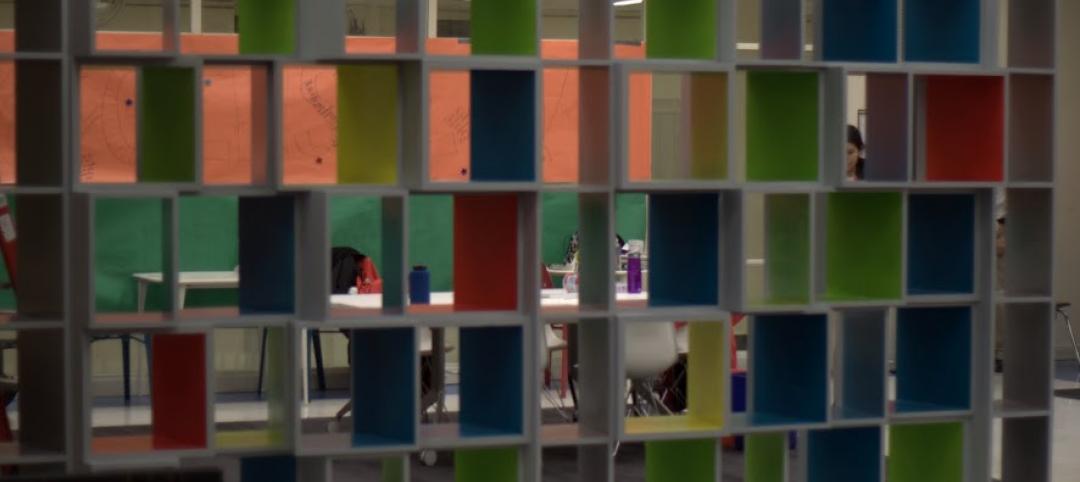Located in the heart of University of Ottawa, the 15-story Vanier Hall functions as the new home of the large Faculty of Social Science and ‘stands tall’ as a living example of sustainable design boasting the intangibles of a rich and inspiring learning atmosphere, plus the measurable returns of energy saving technology.
From an exterior view, the green plant wall provides a striking contrast to the glass and steel structure. Once inside, visitors can fully appreciate a spectacular six-story-high feature – the largest living wall biofilter in North America at 1,370 square feet. In addition to the aesthetic impact, the biofilter is also part of the building’s sustainable design efforts.
Improves Air Quality and Building Performance
In simple terms, a Nedlaw Living Wall Biofilter is a working machine that harnesses nature’s remarkable ability to ‘eat’ pollutants. Contaminated indoor air is drawn through the biofilter where microorganisms on the root media consume airborne pollutants as food. This removal process cleans 80 – 85% of volatile organic compounds (VOCs) from the air, creating virtual outside air. The cleansed air is then re-circulated through the buidling’s HVAC system.
The ‘soft’ benefits of the living wall include dust control, sound abatement, white noise in the form of running water, and a noticeable ‘smell’ of fresh air.
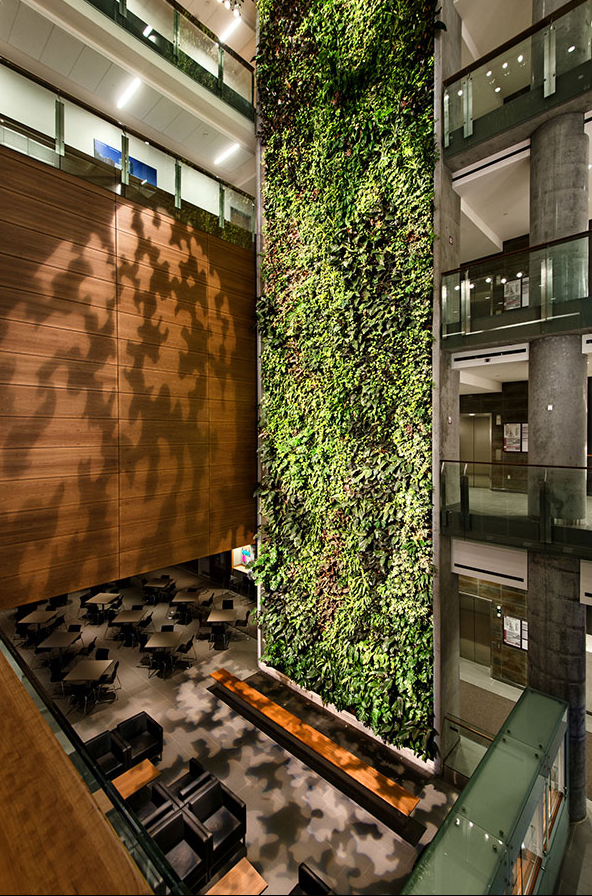
In terms of improving building performance, the biofilter at Vanier Hall can provide 75 – 80% of the building’s fresh air intake requirement, which not only enhances air quality but also significantly improves energy performance by reducing the amount of air intake and, consequently, heating and cooling costs. Additionally, the wall provides all of the building’s humidity and no mechanical humidification is needed.
The living wall biofilter at Vanier Hall includes energy smart features designed to address certain energy lapses in traditional building systems. For example, water recycled from storm water runoff and HVAC condensation is used for the hydroponic plant wall. According to Dr. Alan Darlington (founder of Nedlaw Living Walls), “We’ve done a lot of work to streamline and make this as efficient as possible without losing the aesthetics of this system.”
Calculating the ROI of Living Wall Biofilters
In recent years, Nedlaw has completed numerous studies to show the effectiveness of contaminant removal from indoor air and has now quantified the return on investment based on energy savings. By replacing outdoor air that needs to be conditioned, a Nedlaw Living Wall Biofilter reduces a building’s energy needs. In general terms, a fully-integrated biofilter can reduce energy costs by up to 30%, because the biofilters provide clean air at a fraction of the cost of traditional systems.
In a recent study completed for a major international retail chain, it was determined that the proposed living wall biofilter could provide 100 litres per second of outside air – meaning the building needed to take in that much less outside air.
Using the biofilter as a source of clean air would reduce the energy consumption of the HVAC system by 32.5 GJ of energy for square metre of biofilter used. If properly integrated into the building (for example, naturally lit and connected directly to the HVAC), the biofilter would require as little as 0.4 GJ of energy per square metre per year. This gives a total annual energy savings of the system of 32.1 GJ. This is equivalent to roughly 5 barrels of oil or 1.6 tonnes of CO2 saved per square metre of biofilter.
For this study, it was determined that approximately 400 m2 of biofilter would be used. Assuming a combined energy cost for electricity and natural gas of $10 USD per GJ and if the biofilter is used to its maximum potential then the payback period for the capital cost associated with the biofilter could be less than 3 - 5 years.
PROJECT DETAILS
Location: University of Ottawa, Vanier Hall
Architect: Diamond Schmitt Architects, KWC Architects
Award of Excellence / Interior Green Wall - Green Roofs for Healthy Cities
LEED Gold Certified
MEDIA COVERAGE
University of Ottawa Tower Wins 3 Awards
ABOUT NEDLAW LIVING WALL BIOFILTERS
Related Stories
| May 23, 2012
Summit Design+Build selected as GC for Chicago restaurant
Little Goat will truly be a multifunctional space. Construction plans include stripping the 10,000 sq. ft. building down to the bare structure everywhere, the installation of a new custom elevator and adding square footage at the second floor with an addition.
| May 21, 2012
Wayne, Pa.'s Radnor Middle School wins national green award
Radnor Middle School among the most sustainable schools in the U.S.
| May 16, 2012
AEG releases 3D video of L.A.'s Farmers Field
The Los Angeles Convention Center footage depicts the new convention center hall spaces, including a new lobby above Pico Boulevard, pre-function space, and what will be the largest multi-purpose ballroom in Los Angeles.
| May 15, 2012
Suffolk selected for Rosenwald Elementary modernization project
The 314-student station elementary school will undergo extensive modernization.
| May 11, 2012
Chapter 10 Action Plan: 18 Recommendations for Advancing Sustainability in Reconstructed Buildings
We offer the following recommendations in the hope that they will help step up the pace of high-performance building reconstruction in the U.S. and Canada. We consulted many experts for advice, but these recommendations are solely the responsibility of the editors of Building Design+Construction. We welcome your comments. Please send them to Robert Cassidy, Editorial Director: rcassidy@sgcmail.com.
| May 9, 2012
International green building speaker to keynote Australia’s largest building systems trade show
Green building, sustainability consultant, green building book author Jerry Yudelson will be the keynote speaker at the Air-Conditioning, Refrigeration and Building Systems (ARBS) conference in Melbourne, Australia.
| May 9, 2012
Stoddert Elementary School in DC wins first US DOE Green Ribbon School Award
Sustainable materials, operational efficiency, and student engagement create high-performance, healthy environment for life-long learning.
| May 8, 2012
Gensler & J.C. Anderson team for pro bono high school project in Chicago
City Year representatives came to Gensler for their assistance in the transformation of the organization’s offices within Orr Academy High School, which also serve as an academic and social gathering space for students and corps members.
| May 8, 2012
Morgan/Harbour completes three projects at Columbia Centre
Projects completed on behalf of property owner, White Oak Realty Partners, LLC, Pearlmark Realty Partners, LLC and Angelo Gordon & Co.
| May 7, 2012
Best AEC Firms: MHTN Architects nine decades of dedication to Utah
This 65-person design firm has served Salt Lake City and the state of Utah for the better part of 90 years.


